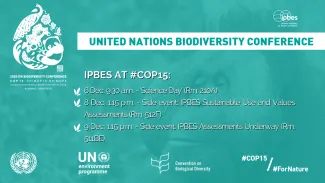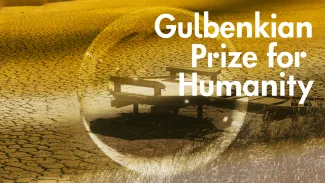
IPBES Announces Co-Chairs to Lead Key Assessment of Invasive Alien Species
On International Day for Biological Diversity
IPBES Announces Co-Chairs to Lead
Key Assessment of Invasive Alien Species
Bonn (IPBES News) – Three leading global experts have today been announced as the co-chairs of a new and vitally important assessment by the Intergovernmental Science-Policy Platform on Biodiversity and Ecosystem Services (IPBES), of existing knowledge regarding invasive alien species and their control.
Professors Helen Roy MBE (United Kingdom), Aníbal Pauchard (Chile) and Peter Stoett (Canada) will head a team of more than 70 expert authors, to be selected from a large pool of nominations, by the end of June this year.
Invasive alien species were identified, just weeks ago in the landmark IPBES Global Assessment Report, as one of the top five global culprits driving negative change in nature around the world – with numbers having risen by 70% since 1970 across 21 countries.
Once completed, the new three-year assessment will offer Governments and decision-makers at all levels the best available evidence on the array of invasive alien species; their impacts on biodiversity and nature’s contributions to people – especially to health and livelihoods; how and why they spread; levels of public awareness; as well as the effectiveness of current control measures and options for further policy and action.
Welcoming the announcement of the three co-chairs, Dr. Anne Larigauderie, Executive Secretary of IPBES said: “The overwhelming coverage and impact of the IPBES Global Assessment Report has demonstrated that there is renewed concern, understanding and commitment to action to reduce and reverse the destruction of nature at every level. The three eminent scientists who have been chosen to lead this new IPBES assessment will have the opportunity to seize this momentum and to build on it in the context of the new post-2020 framework for biodiversity that will be adopted in China next year by the Governments of the world – at the 2020 UN Biodiversity Conference of the Convention on Biological Diversity.”
The IPBES technical support unit for the assessment is hosted in Tokyo, Japan by the Institute for Global Environmental Strategies (IGES) and supported by the Ministry of the Environment of the Government of Japan. Noriko Moriwake, Head of the technical support unit, said: "Our team is greatly excited to support the co-chairs and other experts who will be selected. This work will offer critical new insights and options to underpin innovative policy with cutting-edge science and data."
The first author meeting of the assessment is planned for August 2019 in Japan – with a first draft expected to be ready for open expert review in 2020.
Aníbal Pauchard is Professor at the Faculty of Forestry Sciences at the University of Concepción in Chile. He is also Researcher in the Institute of Ecology and Biodiversity as well as the Founder and Director of the Laboratory of Biological Invasions. Professor Pauchard’s main research interests are the ecology of biological invasions and broader issues associated with the conservation of biodiversity. He was a lead author in the IPBES Regional Assessment for the Americas and has published more than 100 papers in scientific journals. He is currently Vice-president of the Society of Ecology of Chile and Associate Editor of several journals such as the Journal of Applied Ecology and Biological Invasions.
Helen Roy MBE is an Individual Merit Scientist and Group Leader at the Centre for Ecology & Hydrology in the United Kingdom. Her research focuses on using large-scale and long-term datasets to assess the dynamics of invasive alien species and their effects on biodiversity and ecosystems. She serves in leading positions for major European Union and UK projects, networks and consortia. Professor Roy was a lead author in the IPBES Regional Assessment for Europe and Central Asia and has authored more than 100 scientific publications and 13 books. She is passionate about public engagement with science and has received a number of accolades, including Member of the Order of the British Empire (MBE), for her contributions to the media, popular science writing and citizen science initiatives.
Peter Stoett is Dean and Professor at the Faculty of Social Science and Humanities, at Ontario Tech University in Canada. His main areas of expertise include international relations and law, global environmental politics, biodiversity conservation, and human rights. He is also a Senior Research Fellow with the Earth Systems Governance Project of the Future Earth research consortium and an Expert Member of the Invasive Species Specialist Group of the International Union for the Conservation of Nature. Professor Stoett has written, co-written and co-edited more than 10 books and more than 55 peer-reviewed articles and chapters in edited books, and was a Coordinating Lead Author for the three-year Global Environmental Outlook 6 report recently published by UN Environment.
Enquiries: [email protected]
About IPBES:
Often described as the “IPCC for biodiversity”, IPBES is an independent intergovernmental body comprising more than 130 member Governments. Established by Governments in 2012, it provides policymakers with objective scientific assessments about the state of knowledge regarding the planet’s biodiversity, ecosystems and the contributions they make to people, as well as the tools and methods to protect and sustainably use these vital natural assets. For more information about IPBES and its assessments visit www.ipbes.net
Video introduction to IPBES: www.youtube.com/watch?v=oOiGio7YU-M
Additional videos:
- IPBES Assessment of Land Degradation and Restoration (2018): www.youtube.com/watch?v=KCt7aai17Nk
- IPBES Regional Assessments of Biodiversity and Ecosystem Services (2018): www.youtube.com/watch?v=kR0HeepbWCc
- IPBES Assessment of Pollinators, Pollination and Food Production (2016): www.youtube.com/watch?v=YwkYbeiwK5A
- IPBES Assessment of Scenarios and Models of Biodiversity (2016): www.youtube.com/watch?v=wZfcDmtGa9I






